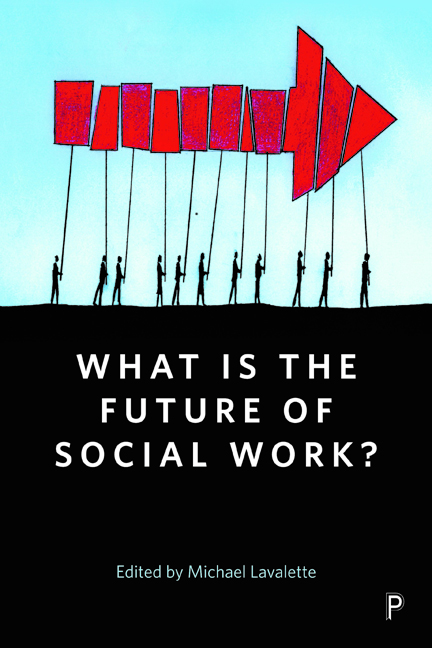Book contents
- Frontmatter
- Contents
- List of Figures and Tables
- Notes on Contributors
- Editor’s Acknowledgements
- Foreword
- Introduction: What is the Future of Social Work?
- 1 Austerity and the Context of Social Work Today
- 2 Contemporary Developments in Child Protection in England: Reform or Reaction?
- 3 The Slow Death of Social Work with Older People?
- 4 Mental Health Social Work: The Dog that Hasn’t Barked
- 5 Learning Disabilities and Social Work
- 6 Social Work by and for All
- 7 Anti-Oppressive Social Work, Neoliberalism and Neo-Eugenics
- 8 From Seebohm Factories to Neoliberal Production Lines? The Social Work Labour Process
- 9 Social Work and the Refugee Crisis: Reflections from Samos in Greece
- Conclusion: The Road to an Alternative Future?
- References
- Index
9 - Social Work and the Refugee Crisis: Reflections from Samos in Greece
Published online by Cambridge University Press: 03 March 2021
- Frontmatter
- Contents
- List of Figures and Tables
- Notes on Contributors
- Editor’s Acknowledgements
- Foreword
- Introduction: What is the Future of Social Work?
- 1 Austerity and the Context of Social Work Today
- 2 Contemporary Developments in Child Protection in England: Reform or Reaction?
- 3 The Slow Death of Social Work with Older People?
- 4 Mental Health Social Work: The Dog that Hasn’t Barked
- 5 Learning Disabilities and Social Work
- 6 Social Work by and for All
- 7 Anti-Oppressive Social Work, Neoliberalism and Neo-Eugenics
- 8 From Seebohm Factories to Neoliberal Production Lines? The Social Work Labour Process
- 9 Social Work and the Refugee Crisis: Reflections from Samos in Greece
- Conclusion: The Road to an Alternative Future?
- References
- Index
Summary
Introduction
Our work with refugees on Samos has been rooted in our common humanity and informed by mutual respect, solidarity and empathy. In Samos we have come to recognise that these human qualities are shaped by where you stand with the refugees. If you stand shoulder to shoulder as brothers and sisters it nearly always followed that relationships form where people connect, despite massive differences in background and experience. Even in 2015 when the average stay of the refugees on Samos was two to three days it was astonishing to see so many friendships made between the refugees and the local activists who met them on the beaches and helped provide clothes and food. Even two years later many of these connections have endured.
On the other hand we also saw many ‘helpers’ who did not stand with and alongside the refugees. These people could talk the talk of their concern for the refugees but they saw themselves as both different and superior. Such an attitude prevented meaningful contact with the refugees and often led to ‘help’ being given in ways which were humiliating and disrespectful. This was evident in many ways. Refugees for example were and are viewed as supplicants with almost no rights to even choose the clothes they were given. If a young male refugee refused a needed pair of jeans, for example, he was immediately seen as ungrateful. The very idea that refugees should care about how they looked or comment on the labels/brands on offer was seen as outrageous. Yet in so many ways the young adult refugees are just like their European counterparts in that they do obsess about labels and brands and do care greatly about their appearance ‒ one of the very few parts of their lives they now have any sort of control over. Virtually every other aspect, from what they eat to where they sleep and when they can move are under the complete control of others.
Since the EU/Turkey pact in March 2016 refugees have been detained for months on Samos and it is possible to see more clearly how refugees fight to hold on to some control. At the cricket matches organised by the Pakistani refugees the hairstyles of many of the players are stunningly fashionable.
- Type
- Chapter
- Information
- What Is the Future of Social Work? , pp. 143 - 160Publisher: Bristol University PressPrint publication year: 2019

